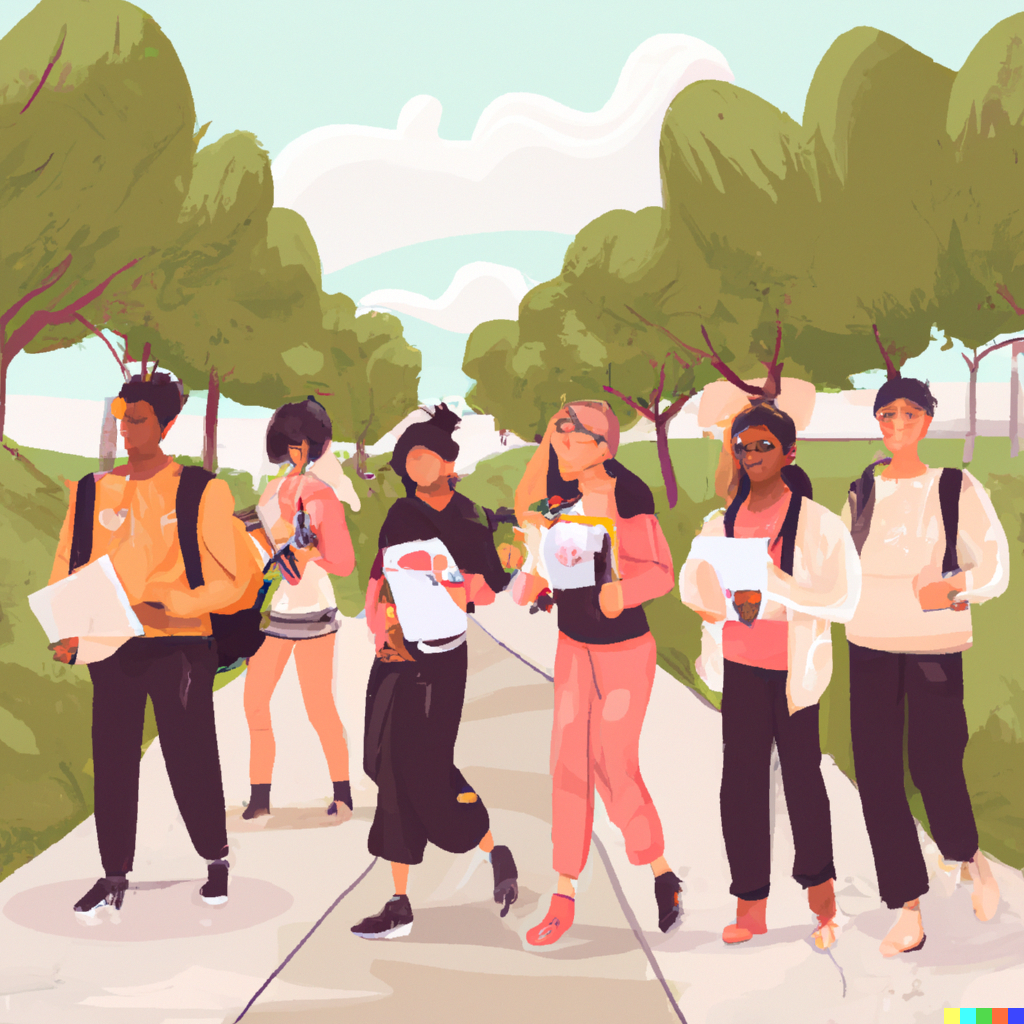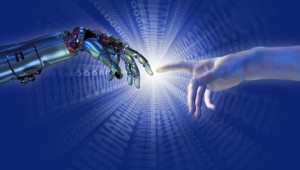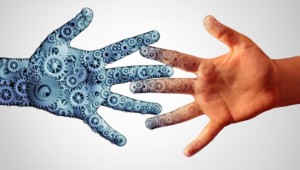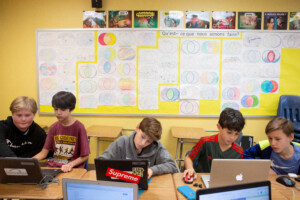Learning as a Collective
Key Points
-
Schools are organized within specific configurations of space and time. These configurations can be reconfigured.
-
Perhaps the first step toward having schools bring together the collective is for schools to treat learners as members of a collective.

By: Benjamin Freud, Ph.D.
I’m not getting myself all worked up over how generative AI is going to revolutionize the world of education. I’m not spending too much time trying to find my bearings and make sense of this new world we entered since OpenAI’s successful promotion strategy of ChatGPT.
AI didn’t emerge out of nowhere on November 30, 2022. We could all see this coming when IBM’s Watson outperformed two former Jeopardy champions, demonstrating the superior information retrieval capabilities of a fast processor and large memory bank compared to the human brain. This false comparison is one we often hear, and it’s no wonder we feel uneasy about AI. We tend to view the brain as one big computer, overlooking its organic, emergent network. We fear becoming obsolete.
In response, we build walls to protect ourselves, afraid that AI will take our jobs, send us hurling into uncertainty, puppet us all in its relentless quest to purchase cheaper paperclips. We call out to celebrate (reclaim?) the attributes that supposedly make us human, uniquely human. You can pick out of a hat which attributes you want to defend, it really doesn’t matter — let’s celebrate because AI is a threat to everything that doesn’t make humans stand out.
Unfortunately, we also believe in human exceptionalism. We believe that we have the right, nay the duty, to ignore the laws of Nature so that we may write our own. Reclaiming what makes us uniquely human is the same treacherous game we’ve been playing all along. It is a game of separation and domination, extraction and extinction.
Imagine schools as places where we learn through contribution to all life.
Benjamin Freud
Our society continues to place value on competition, wealth-creation, hierarchization, and meritocracy. We ask ourselves what “the future of education” will be, ignoring that education is but one part of the greater systemic whole and that the latter is too resilient and empire-oriented to permit any of the changes to education that will threaten it. Suffice it to say, AI will not revolutionize education. ChatGPT and other tools of the future might change how we do things, but none of them will change why we do things.
That is up to us, and that is where we must hold hope.
An Old Story
Perhaps there is a modern “school-focused” twist on the allegory of the cave. In this version, rather than prisoners mistaking shadows on the wall for reality, schools are fully aware that there is a vibrant world outside the cave. Here, the purpose of school is to prepare students for that world, the real world. For 12 years, young people document knowledge and facts and skills, “proving” just how full of knowledge and facts and skills they are. Schools aim to get kids ready for the real world outside the cave, this magical place that awaits them. They have to make sure that the product is good enough for release.
There is no real world and school world dichotomy. How dare we suggest that kids live in a world that is sub-real? Kids live in their world and it is absolutely real — full of hopes, fears, joys, dramas, transformations, and setbacks.
In truth, there is no cave. People of all ages learn all the time, everywhere and under incredible circumstances. We reconfigure the spacetime of learning by dispelling the cave. Now, we stand under the vast blue sky, together, and we can start our journey, together. In which direction shall we head? Will we walk together?
If we do, we don’t have to notice the same marks in the landscape as we head toward the horizon. We don’t have to walk single file. We don’t even have to draw the same maps. But we must walk together. And when we look around, we see that this walk together, means all life together: human, non-human, and more than human.
When we do this, we become a collective, a bio-collective. A collective doesn’t mean we are all the same. It means that we are all together, not separated, celebrating all of our diversities coming together. In the words of Bruno Latour, “All, but not two.”
A New Story
Imagine schools as places where we learn through contribution to all life. Not places where we are inspected for our knowledge and facts and skills. Imagine success no longer determined by individual assessments or grades. Rather, success is measured by the contributions made to the thriving of the bio-collective.
I am because you are, I succeed because you succeed, and I thrive because you thrive.
This is the horizon toward which we head. I’m not suggesting it’s where we need to be now. I’m not providing a map of how to get there either. I’m asking what would it take for that first step? I’m asking how we can dispel the cave and not build more walls and monuments to preserve and glorify our human exceptionalism?
The story of the whole is more than the story of our society, our systems, and our ways of living. The story of the whole is the story of human non-exceptionalism. It is not the story of how we act on the world, but how we respond as the world.
So let us tell the story of the whole, of our entanglement as the world. This is a new story that we can enact. Through this enactment, we can create a new culture and a new set of values for these liminal times.
Let us tell this story with a diverse group of voices — from education, from schools, and from learners. This is no longer the story of competition and nationalism, individualization and separation. This is the story of coming together, sharing, and contributing to the whole.
What would it take to write this new story in our schools today?
Learning as a Collective
Schools are organized within specific configurations of space and time. These configurations can be reconfigured.
Perhaps the first step toward having schools bring together the collective is for schools to treat learners as members of a collective. No longer individualizing, quality checking each product along every stage of what the school churns out, of what the school wants its typical graduate. In this collective, the learner-doer’s successes might simply be the measures of their positive contributions to community. It’s not “show what you know,” it’s “How have you contributed to the community, as a member of the community?”
This doesn’t mean we let go of “traditional learning” or assessments. Instead, we reconceptualize them. For instance, we write narrative texts and our success is based on how much we moved the thinking and the feeling of our targeted readers — not whether we use the right transition phrases or enough literary devices. Through making and growing, we tell the story of contribution to the collective.
These might sound like big, utopian ideas, but this is a time to come together around hope, not despair, kinship, not exceptionalism, courage not cynicism.
While grand in scope, it isn’t so difficult to imagine. After all, many of these things are what make us human. Isn’t this what happens in the workplace? In the “real world?” In our homes? The emphasis may not always be on contribution to the collective, but we determine our success based on the mark we have left: sales based on consumer demand; reduced use of automobile traffic in favor of bicycles thanks to redesigned bike lanes; a sense of higher quality of life after the implementation of a well-being program.
This is not the time to act out of fear. This is not the time to let the storm gather outside (metaphorically and otherwise) as we hide behind our human exceptionalism and exponential tools. This is not the time to separate ourselves from the world as 150 to 200 species of plants, insects, birds, and mammals go extinct every day, according to the International Union for Conservation of Nature (IUCN).
This is the time to come together as a collective, a bio-collective. Instead of walling ourselves off, let’s set limits on that which prevent life from thriving and regenerating. Let’s tell a new story of the world, by the world. This story doesn’t get told unless all places of learning and generations of learners walk together.
In which direction shall we head? Will we walk together?
Benjamin Freud, Ph.D is an educator, learning dialogist, writer, and podcaster. He is the co-founder of Coconut Thinking, an advisory that helps and supports educators nurture learning ecosystems grounded in relationships that contribute to the thriving of the bio-collective—any living thing that has an interest in the healthfulness of the planet.







0 Comments
Leave a Comment
Your email address will not be published. All fields are required.